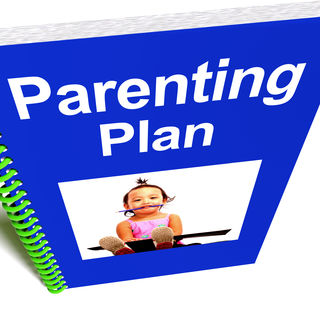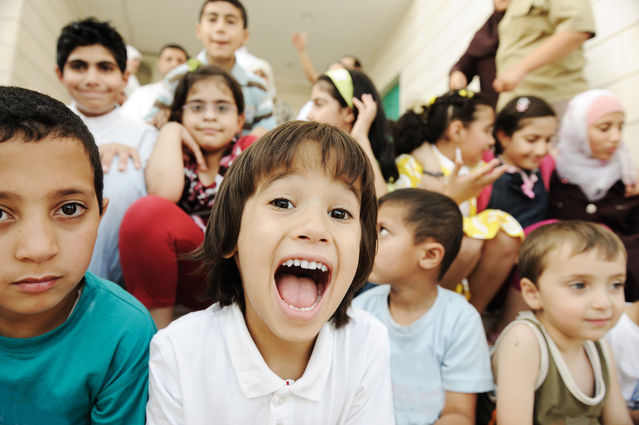Divorce
Enhancing Positive Outcomes for Children of Divorce
Six (Evidence-Based!) Skills for Parents
Posted March 30, 2018
Again I am extremely lucky to have an expert co-author, C. Aubrey Rhodes on this article. Aubrey is a Doctoral student in Clinical Psychology at Arizona State University whose research and clinical interests are helping create positive outcomes for children of divorce.
Divorce can be difficult. More than the end of a relationship, it often means major changes in the way lives are lived. Navigating this transition can be incredibly taxing for everyone in the family. For divorcing parents, there is the added burden of worrying about how their children will adjust, in both the short- and long- term, to a new family structure.

Many parents have questions about how their children will fare and what they can do. They often ask:
- As a parent, how can I support my children throughout the transition?
- How worried should I be about the impact the divorce will have on their future?
- Can I even do anything about it?
Let’s review some of the latest psychological research on the long-term effects of divorce to answer these (and more!) questions.
Question: Is my child going to go through this alone? How common is divorce for children?
Answer: It is estimated that between 30-50% of children will experience parental divorce before they turn 18 (National Center for Health Statistics, 2008). So, it is likely that your child will know many children who either have gone, or are going through, a similar situation.
Question: How will my divorce impact my children?
Answer: Most children are distressed and upset about the divorce in the short term (O’Hara, Wolchik, and Sandler, in press). It is important to know, however, that the majority of children do not develop significant adjustment problems that will endure throughout their lives as a result of divorce (Shifren, et al, 2015; Amato, 2001). Unfortunately, a substantial minority of children in divorced families do experience long-term negative outcomes that can follow them into adulthood, including higher rates of mental disorders, less success in school, higher rates of substance use, poorer peer relationships, and more risky sexual behaviors, to name a few (e.g., Wolchik et al 2014; Afifi, Boman, Flissher, & Sareen, 2009; Amato, 2001). Thus, parents do need to be aware of the potential for long-term negative effects of the divorce on their children.
While children of divorce are indeed at substantial risks for long-term negative consequences, this does not mean that this beyond our control. The great news is that parents have the capacity to truly help their children after divorce. Having a supportive adult in their lives gives children the best chance of continuing to develop without problems (Sandler, et al. 2012).
Question: Alright, so what can I do? I’ve read so many suggestions from so-called experts, how can I choose what really helps?
Answer: Look to evidence-based recommendations.

There are one thousand parenting books available that would give you at least as many different recommendations; some reasonable and others – not so much. The best way to address this issue, therefore, is to turn to science to see which recommendations actually work.
One of the most comprehensive studies on preventing long-term problems for children of divorce is being conducted by Dr. Sharlene Wolchik at Arizona State University. Dr. Wolchik and her colleagues designed the New Beginnings Program (NBP), a parenting-focused intervention for divorcing families. The NBP is a 10-session program designed to promote effective parenting following separation or divorce. It focuses on working with parents to achieve important parenting-related competencies, including using effective discipline, communicating and listening effectively, building more positive interactions, and keeping children out of the middle of the conflict.
To determine whether this brief parenting intervention was effective in helping children after divorce, the researchers followed 240 families who initially went through the program immediately after the program, 6 months, 6 years, and 15 years after completion. They asked both the parents and the children about the stressors they experienced, their feelings, like depression and aggression, and positive outcomes, such as believing in oneself and actively coping with life’s challenges. Another group, referred to as the control group, was given 3 popular self-help books to read about coping with divorce. To determine whether their program was effective, Dr. Wolchik and her colleagues compared the experiences of the families who had gone through their program with those of people who had only read the books.

The New Beginnings Program has been shown to be extremely effective (Wolchik et al, 2015; Christopher et al, 2017).
- Fifteen years after the intervention, young adults whose mothers had participated in the New Beginnings Program had significantly lower levels of internalizing disorders, such as anxiety and depression, than children whose families did not enter the program
- Almost 25% of adolescents and young adults whose mothers did not go through the program reported depression in the past nine years, versus less than 8% of adolescents and young adults whose mothers went through the program; rates over three times as high.
- The rate of internalizing disorders was three times as high for those who did not get the intervention.
- Male young adults of mothers in the program engaged in substantially less substance and drug use fifteen years later.
- Importantly, children whose mothers went through the program reported being less likely to think about how the divorce continued to cause struggles for them.

In addition to preventing long-term negative outcomes, NBP has also led to a variety of positive outcomes (Velez et al, 2011; Sigal et al, 2012; Bonds et al, 2010). Six years after the intervention, adolescents of mothers who had participated in the program:
- Were better able to actively cope with their problems.
- Had more faith in their ability to effectively manage life’s challenges, an important predictor of success.
- Were more likely to set higher educational goals and have more ambitious job aspirations.
- Reported higher mother-child relationship quality.
- Reported higher self-esteem.
- Had better academic grades.
Question: OK, so the program is very effective. What does that have to do with me?
Answer: Parents who used the skills taught in the program saw positive changes in their relationships with their children as well as in their children adjustments. So, using some of these skills may help you help your children.

The New Beginnings Program was effective because of the way that parents changed their own behaviors, interactions, and relationships with their children. The program was not magic; rather, parents in the program learned a distinct set of skills that allowed them to help their children to dream bigger, handle problems more effectively, and avoid negative life experiences. If those parents learned the skills and helped their children, you can too!
Six Key Takeaways from NBP (and other research) for Parents of Divorce (adapted from O’Hara, Wolchik, and Sandler, in press):

- Protect your children from the conflict. Conflict between parents is the one of the strongest predictors of children’s problems following divorce (Davidson, O’Hara, and Beck, 2014; Amato, 2001). Thus, the most important things you can do to help your child cope with the divorce is to keep your child from witnessing or being in the middle of conflict! Work with the other parent to ensure that difficult conversations, phone calls, etc., happen when the children are not around. To refrain from having these discussion, it can be helpful to put yourself in your children's shoes and imagine what it feels like when the two people who are most important to you are literally or figuratively tearing each other apart. Tell the other parent that you will not talk about difficult issues when the children are present.
- Don’t recruit! Do not ask your children to be go-betweens or messengers. Parents sometimes ask their children to relay what may seem like innocent messages to their former partners. These messages may not be interpreted as such by the other parent and thus make it challenging for him or her to not recruit their children to “their side.” The solution? Avoid having your children give ANY messages. Also, although it can be tempting, resist the urge to use your child as a confidant or to cast the other parent in a negative light. Ultimately, putting your child in these positions hurts them.
-
 Being present means mindfully attentive..Source: Storyblocks - used with permission
Being present means mindfully attentive..Source: Storyblocks - used with permissionBe supportive! There are many ways to provide support. Being a good listener and encouraging them to talk about their emotional experiences speaks volumes! Asking open-ended questions and validating your children's feelings show them that you care. Additionally, spending more high-quality time with children demonstrates your support. This is mindful time when you are not just physically with them, but mentally connected. Put away your cell phone and other distractions so you can give them your focused, undivided attention. Consider implementing “Family Fun Time” once a week, where children choose a one-hour (inexpensive) activity (think bowling, having a picnic, or playing a board game) that everyone can enjoy.
- Provide structure! Create a predictable environment by enforcing structure. After a divorce, children’s routines often fly out the window! Talk to your children about your family's routines and be clear about what will stay the same and what will change. Continue to enforce effective family rules, such as age-appropriate consequences, or make new ones if old habits no longer make sense. While it is understandable that no one wants to be the “bad parent” by seeming too strict, the truth is that rules and structure give children a sense of predictable that is important when so much is changing in their world.
- Take care of yourself! One of the best things you can do for your children is make sure that you take care of your own emotional and physical needs. You cannot support your children if you are not able to support yourself! Go easy on yourself; remind yourself that you are going through a lot of changes, and that finding a new normal will take time. Lean on your adult support system; consider speaking with friends, family, or a therapist!
- Practice effective communication with your former partner. Regular communication and information exchange between separated parents is necessary and beneficial for children (Lee & Bax, 2000). Establish clear expectations about how you want to communicate early on. Be cautious about your tone of conversation. Try as much as you can to speak in a friendly or civil tone and avoid shouting. Determine your preferred modes of communication, such as phone, text, e-mail, or in person. Try to stay focused on present day issues and avoid communicating when you’re upset. If necessary, take a communication-focused course or get a mediator to facilitate exchange of information. Try to convert your relationship from that of a married couple to that of a cooperative business-type relationship.

New research on the impact of preventative programs for children of divorce is providing answers about the power of specific parenting techniques to improve positive outcomes.

Dr. Wolchik and colleagues are beginning to collect data for a 26-year follow up of the initial NBP program. This project focuses on the impact of preventative programs across generations. It is hypothesized that the positive parenting practices learned in the New Beginnings Program will be passed on to the next generation, leading to more effective parenting practices, healthier children and happier families! Stay tuned for this next exciting chapter.
Best,
Aubrey Rhodes and Neil Farber
Follow Neil on Twitter and on instagram@thekeytoachieve
Like my Facebook page, "The Key to Achieve"
Check out my newest book on Amazon, Throw Away Your Vision Board: The Truth About the Law of Attraction
Check out my book on Amazon, Making Lemonade: 101 Recipes to Convert Negatives into Positives
Please visit our website www.TheKeytoAchieve.com
References
Amato, P. R. (2010). Research on divorce: Continuing trends and new developments. Journal of marriage and family, 72(3), 650-666
Sandler, I. N., Wolchik, S. A., Winslow, E. B., *Mahrer, N., Moran, J., & Weinstock, D. (2012). Quality of maternal and paternal parenting following separation and divorce. In K. Kuehnle & L. Drozd (Eds.), Parenting plan evaluations: Applied research for the family court (pp. 85-122). New York, NY: Oxford University Press.
Lee CM and Bax KA: Children’s reactions to parental separation and divorce. Paediatr Child Health, v.5(4); May-Jun 2000
Afifi, T. O., Boman, J., Fleisher, W., & Sareen, J. (2009). The relationship between child abuse, parental divorce, and lifetime mental disorders and suicidality in a nationally representative adult sample. Child abuse & neglect, 33(3), 139-147
Christopher, C., Wolchik, S., Tein, J. Y., Carr, C., Mahrer, N. E., & Sandler, I. (2017). Long-term effects of a parenting preventive intervention on young adults’ painful feelings about divorce. Journal of Family Psychology, 31(7), 799.
Amato, P. R. (2001). Children of divorce in the 1990s: an update of the Amato and Keith (1991) meta-analysis. Journal of family psychology, 15(3), 355.
Davidson, R. D., O'Hara, K. L., & Beck, C. J. (2014). Psychological and biological processes in children associated with high conflict parental divorce. Juvenile and Family Court Journal, 65(1), 29-44.
Lee, C. M., Beauregard, C., & Bax, K. A. (2005). Child-related disagreements, verbal aggression, and children's internalizing and externalizing behavior problems. Journal of family psychology, 19(2), 237.
McClain, D. B., Wolchik, S. A., Winslow, E., Tein, J. Y., Sandler, I. N., & Millsap, R. E. (2010). Developmental cascade effects of the New Beginnings Program on adolescent adaptation outcomes. Development and Psychopathology, 22(4), 771-784.
O’Hara, K.L., Wolchik, S., & Sandler, I. (under review). Divorce: Recommendations for the Home. In K. Minke & G. Bear (Eds.), Helping Children Handouts: Prevention and Intervention Strategies for Common Concerns at School and Home. National Association of School Psychologists
Shifren, K., Bauserman, R. L., Blackwood, J., Coles, A., & Hillman, A. (2015). Personality and Mental Health: A Comparison of Emerging Adult Women from Divorce and Intact Families. Journal of Adult Development, 22(4), 221-229.
Sigal, A. B., Wolchik, S. A., Tein, J. Y., & Sandler, I. N. (2012). Enhancing youth outcomes following parental divorce: A longitudinal study of the effects of the New Beginnings Program on educational and occupational goals. Journal of Clinical Child & Adolescent Psychology, 41(2), 150-165.
Vélez, C. E., Wolchik, S. A., Tein, J. Y., & Sandler, I. (2011). Protecting children from the consequences of divorce: A longitudinal study of the effects of parenting on children’s coping processes. Child development, 82(1), 244-257.
Wolchik, S. A., Sandler, I. N., Tein, J. Y., Mahrer, N. E., Millsap, R. E., Winslow, E., ... & Reed, A. (2013). Fifteen-year follow-up of a randomized trial of a preventive intervention for divorced families: effects on mental health and substance use outcomes in young adulthood. Journal of Consulting and Clinical Psychology, 81(4), 660.




